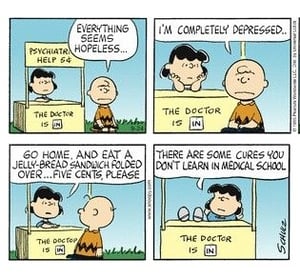 Like the Peanuts cartoon depicts, organizations often have someone operating a complaint department. Most visitors are well-intentioned in their session with the company “therapist.” They’re seeking coaching or advice on a challenging issue and plan to act upon it. Unfortunately, what they often get back is the equivalent of Lucy’s “Eat a jelly-bread sandwich” guidance to Charlie Brown.
Like the Peanuts cartoon depicts, organizations often have someone operating a complaint department. Most visitors are well-intentioned in their session with the company “therapist.” They’re seeking coaching or advice on a challenging issue and plan to act upon it. Unfortunately, what they often get back is the equivalent of Lucy’s “Eat a jelly-bread sandwich” guidance to Charlie Brown.
Alternatively, they may just be looking to release some pent-up frustration. They’re looking for “a sympathetic ear, and the promise of keeping things ‘between us.’ In many organizations, these therapists seem to serve a valuable purpose – or at least do no real harm,” writes author, speaker, and business leader Mike Paton.
But is that really the case? Does this habit of “complaint departments” really cause no harm?
Paton continued, “After all, doesn’t every team need an outlet for the inevitable stresses of working in a small business? Or a safe haven where people go to commiserate and vent? I’ve come to understand the answer is ‘no.’ This behavior can have a devastating effect on productivity, solving issues, and team health. The complaint department simply can't resolve business conflicts or company issues.”
Research appears to agree; venting doesn’t produce the desired outcome anyway. In the book Originals by Adam Grant, he writes, “Venting doesn’t diminish the flame of anger; it feeds it…It has been demonstrated that venting doesn’t work even if you think it does – and even if it makes you feel good. The better you feel after venting, the more aggressive you get: not only toward your critic, but also toward innocent bystanders.” Grant went on to make the point that venting out loud to another person cements our negative feelings as the truth in our brains.
So how do you move away from “The Doctor Is In” approach to a healthier and more productive workplace?
“Are You Going To Tell Them, Or Am I?”
The difference lies in a simple question: “Are you going to tell them, or am I?”
For leaders, it’s likely that a significant portion of your day can be spent with folks either doing an end run around their supervisor or in unproductive complaining sessions without the accountability of identifying, discussing, and solving the root issue. For reasons based both in productivity and culture, asking the question “Are you going to tell them, or am I?” before letting the conversation end can be a game-changer for you and your organization.
But what if the individual approaching you insists on keeping your side-bar conversation private? Aside from the truly sensitive HR issues that require the utmost discretion, business coach Ken DeWitt puts it simply: “You can’t solve a problem you can’t talk about.” As leaders we can’t be willing to sweep issues under the rug. To create a healthy workplace, issues need to be addressed openly, not just through a private complaint.
The concept itself is simple, but it isn’t necessarily easy to put into practice. As Paton explains, “Mastering [the identify-discuss-solve method] requires courage, patience, and real strength. During difficult issues-solving sessions, I’ve seen otherwise calm, confident leaders shout, cry, even storm out of the room for a while. As painful as all that emotion and hard work and conflict can be, when it results in a real, permanent solution supported by everyone involved – it’s worth it!”
What’s The Risk?
To quote Mike Paton again, the risk occurs when “you continue manning your complaint department, that’s where all your issues, and productivity, and your healthy culture, will go to die. Because if there’s a place where people can complain or criticize or judge people anonymously and without accountability for resolving the root cause of the underlying issue” why would they ever choose differently?
Of course, organizations should still provide a venue for employees to discuss or report truly sensitive issues. When something such as harassment is occurring, or an unethical business practice is being witnessed, a confidential conversation with a trusted leader is paramount.
For everything else, asking a simple question, “Are you going to tell them, or am I?” should go a long way in driving a healthier culture in your organization.
Perhaps the next time you are visited by someone with an issue, you can simply think or say ‘Lucy!’ to remind yourself there’s a healthier and more productive solution to the complaint department. In any event, I suggest it’s time you hang an Out sign on the office therapist’s door.



